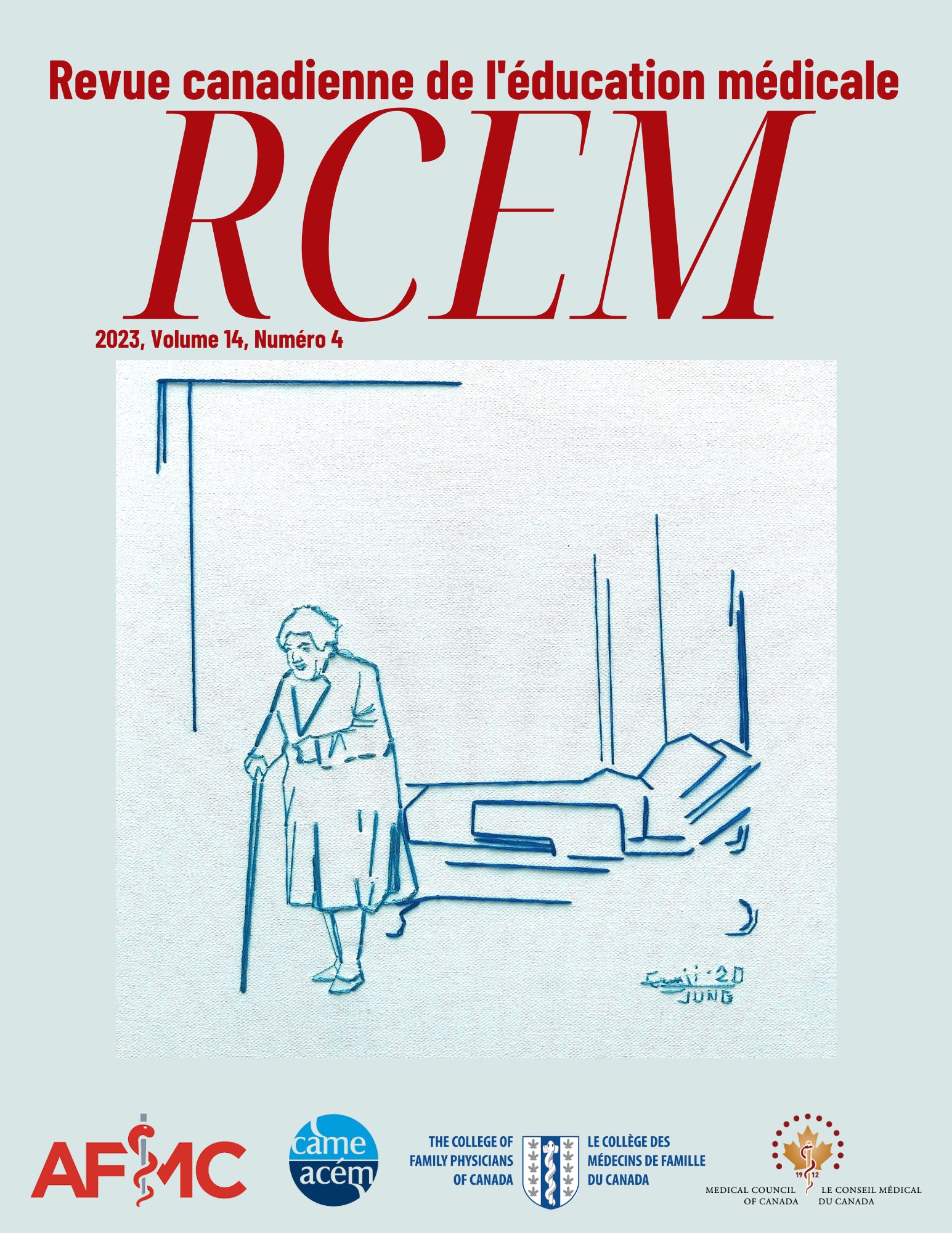Au-delà de la résilience : changer le récit du bien-être des étudiants en médecine
DOI :
https://doi.org/10.36834/cmej.76398Références
Shanafelt TD, Hasan O, Dyrbye LN, et al. Changes in burnout and satisfaction with work-life balance in physicians and the general US working population between 2011 and 2014. Mayo Clinic Proceedings. 2015; 90(12):1600-1613. https://doi.org/10.1016/j.mayocp.2015.08.023 DOI: https://doi.org/10.1016/j.mayocp.2015.08.023
Boudreau RA, Grieco RL, Cahoon SL, Robertson RC, Wedel RJ. The pandemic from within: two surveys of physician burnout in Canada. Can J Comm Mental Health. 2007;25(2):71-88. https://doi.org/10.7870/cjcmh-2006-0014 DOI: https://doi.org/10.7870/cjcmh-2006-0014
Lee RT, Seo B, Hladkyj S, Lovell BL, Schwartzmann L. Correlates of physician burnout across regions and specialties: a meta-analysis. Hum Res Health. 2013;11(1):1-6. https://doi.org/10.1186/1478-4491-11-48 DOI: https://doi.org/10.1186/1478-4491-11-48
Schernhammer E. Taking their own lives—the high rate of physician suicide. N Engl J Med. 2005;352(24):2473-6. https://doi.org/10.1056/NEJMp058014 DOI: https://doi.org/10.1056/NEJMp058014
Brazeau CM, Shanafelt T, Durning SJ, et al. Distress among matriculating medical students relative to the general population. Acad Med. 2014;89(11):1520-5. https://doi.org/10.1097/ACM.0000000000000482 DOI: https://doi.org/10.1097/ACM.0000000000000482
Dyrbye LN, West CP, Satele D, et al. Burnout among US medical students, residents, and early career physicians relative to the general US population. Acad Med. 2014;89(3):443-51. https://doi.org/10.1097/ACM.0000000000000134 DOI: https://doi.org/10.1097/ACM.0000000000000134
Maser B, Danilewitz M, Guérin E, Findlay L, Frank E. Medical student psychological distress and mental illness relative to the general population: a Canadian cross-sectional survey. Acad Med. 2019;94(11):1781-91. https://doi.org/10.1097/ACM.0000000000002958 DOI: https://doi.org/10.1097/ACM.0000000000002958
Dyrbye LN, Sciolla AF, Dekhtyar M, et al. Medical school strategies to address student well-being: a national survey. Acad Med. 2019;94(6):861-8. https://doi.org/10.1097/ACM.0000000000002611 DOI: https://doi.org/10.1097/ACM.0000000000002611
Richardson GE. The metatheory of resilience and resiliency. J Clin Psychol. 2002;58(3):307-21. https://doi.org/10.1002/jclp.10020 DOI: https://doi.org/10.1002/jclp.10020
Windle G. What is resilience? A review and concept analysis. Rev Clin Gerontol. 2011;21(2):152-69. https://doi.org/10.1017/S0959259810000420 DOI: https://doi.org/10.1017/S0959259810000420
Reivich KJ, Seligman ME, McBride S. Master resilience training in the US Army. Amer Psych. 2011;66(1):25. https://doi.org/10.1037/a0021897 DOI: https://doi.org/10.1037/a0021897
Arnetz BB, Nevedal DC, Lumley MA, Backman L, Lublin A. Trauma resilience training for police: Psychophysiological and performance effects. J Police Crim Psych. 2009;24(1):1-9. https://doi.org/10.1007/s11896-008-9030-y DOI: https://doi.org/10.1007/s11896-008-9030-y
Grant AM, Curtayne L, Burton G. Executive coaching enhances goal attainment, resilience and workplace well-being: A randomised controlled study. J Pos Psychol. 2009;4(5):396-407. https://doi.org/10.1080/17439760902992456 DOI: https://doi.org/10.1080/17439760902992456
Dunn LB, Iglewicz A, Moutier C. A conceptual model of medical student well-being: promoting resilience and preventing burnout. Acad Psych 2008;32(1):44-53. https://doi.org/10.1176/appi.ap.32.1.44 DOI: https://doi.org/10.1176/appi.ap.32.1.44
Meeks LM, Ramsey J, Lyons M, Spencer AL, Lee WW. Wellness and work: mixed messages in residency training. J Gen Intern Med. 2019;34(7):1352-5. https://doi.org/10.1007/s11606-019-04952-5 DOI: https://doi.org/10.1007/s11606-019-04952-5
Friedman E, Karani R, Fallar R. Regulation of medical student work hours: a national survey of deans. Acad Med. 2011;86(1):30-3. https://doi.org/10.1097/ACM.0b013e3181ff9725 DOI: https://doi.org/10.1097/ACM.0b013e3181ff9725
Cook AF, Arora VM, Rasinski KA, Curlin FA, Yoon JD. The prevalence of medical student mistreatment and its association with burnout. Acad Med. 2014; 89(5):749. https://doi.org/10.1097/ACM.0000000000000204. DOI: https://doi.org/10.1097/ACM.0000000000000204
D'Amours O. Graduation Questionnaire - National Report. The AFMC. 2019. CID: 20.500.12592/c07ww5.
Gheihman G, Cooper C, Simpkin A. Everyday resilience: practical tools to promote resilience among medical students. J Gen Intern Med. 2019;34(4):498-501. https://doi.org/10.1007/s11606-018-4728-8 DOI: https://doi.org/10.1007/s11606-018-4728-8
Wald HS, Haramati A, Bachner YG, Urkin J. Promoting resiliency for interprofessional faculty and senior medical students: outcomes of a workshop using mind-body medicine and interactive reflective writing. Med Teach. 2016;38(5):525-8. https://doi.org/10.3109/0142159X.2016.1150980 DOI: https://doi.org/10.3109/0142159X.2016.1150980
Kulman‐Lipsey S, Yang S, Pedram Javidan A, et al. An integrative longitudinal resilience curriculum. Clin Teach. 2019;16(4):395-400. https://doi.org/10.1111/tct.13054 DOI: https://doi.org/10.1111/tct.13054
Statistics Canada. Experiences of health care workers during the COVID-19 pandemic, September to November 2021. Jun 2022. Available from https://www150.statcan.gc.ca/n1/daily-quotidien/220603/dq220603a-eng.htm [Accessed on May 10, 2023]
Popowitz E. Addressing the healthcare staffing shortage. Definitive Healthcare. Oct 2022. Available from https://www.definitivehc.com/sites/default/files/resources/pdfs/Addressing-the-healthcare-staffing-shortage.pdf [Accessed on May 10, 2023]
Panagioti M, Panagopoulou E, Bower P, et al. Controlled interventions to reduce burnout in physicians: a systematic review and meta-analysis. JAMA Intern Med. 2017;177(2):195-205. https://doi.org/10.1001/jamainternmed.2016.7674 DOI: https://doi.org/10.1001/jamainternmed.2016.7674
CFMS. Mental health resources for medical student health and wellbeing. https://cfms.org/files/position-papers/archived/2010-Mental-Health-Paper.pdf [Accessed May 10, 2023]
CMA. CMA statement on physician health and wellness: guiding principles and commitments for a vibrant profession. https://www.cma.ca/sites/default/files/2018-11/physician-health-wellness-statement-e.pdf [Accessed May 10, 2023]
Winters M. Medical student wellness: blueprints for the curriculum of the future. Resident & Student Health. 2016. https://www.ama-assn.org/medical-students/medical-student-health/medical-student-wellness-blueprints-curriculum-future [Accessed on May 10, 2023]
Bourcier D, Far R, King LB et al. Medical student wellness in Canada: time for a national curriculum framework. Can. Med. Ed. J. 2021 Nov. 28;12(6):103-7. https://doi.org/10.36834/cmej.73008 DOI: https://doi.org/10.36834/cmej.73008
Winters M. CFMS wellness curriculum framework. https://www.cfms.org/files/wellness-resources/CFMS-Wellness-Curriculum-Framework_FINAL.pdf [Accessed on May 10, 2023].
Téléchargements
Publié
Numéro
Rubrique
Licence
© Jack H Yuan, Renée Reimer, Michael Minkley 2023

Cette œuvre est sous licence Creative Commons Attribution - Pas d'Utilisation Commerciale - Pas de Modification 4.0 International.
La soumission d’un manuscrit original à la revue constitue une indication qu’il s’agit d’un travail original, qu’il n’a jamais été publié et qu’il n’est pas envisagé pour publication dans une autre revue. S’il est accepté, il sera publié en ligne et ne pourra l’être ailleurs sous la même forme, à des fins commerciales, dans quelque langue que ce soit, sans l’accord de l’éditeur.
La publication d’une recherche scientifique a pour but la diffusion de connaissances et, sous un régime sans but lucratif, ne profite financièrement ni à l’éditeur ni à l’auteur.
Les auteurs qui publient dans la Revue canadienne d’éducation médicale acceptent de publier leurs articles sous la licence Creative Commons Paternité - Pas d’utilisation commerciale, Pas de modification 4.0 Canada. Cette licence permet à quiconque de télécharger et de partager l’article à des fins non commerciales, à condition d’en attribuer le crédit aux auteurs. Pour plus de détails sur les droits que les auteurs accordent aux utilisateurs de leur travail, veuillez consulter le résumé de la licence et la licence complète.











